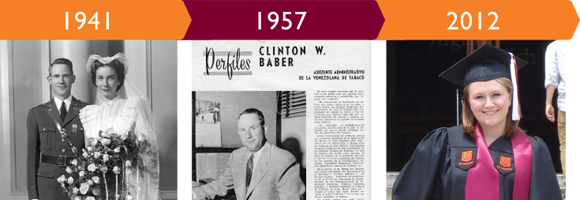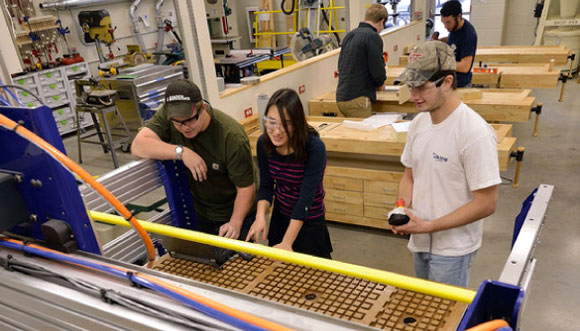PHILANTHROPY

When Clinton W. Baber graduated from Virginia Tech, the United States was in the grips of the Great Depression, and the international community was marching toward World War II. The average car cost $625. Monopoly was the newest board-game sensation.
Seventy-nine years later, the world has certainly changed, but in 2014, the Virginia Tech tradition that Baber (chemical engineering '35) held dear continues to encourage success and inspire innovation, reinforced through a generous scholarship.
"They loved young people," attorney W. Scott Street said of Clinton and Lucille Baber, his longtime friends and clients. "It was no surprise when they contacted me to seek legal assistance for their plans to establish a scholarship at Virginia Tech through their estate."
A native of Fluvanna County, Va., Clinton Baber was elected to multiple honor societies at Virginia Tech. Following an impressive U.S. Army career, during which he attained the rank of colonel, he held leadership roles in both the tobacco and the paper industries before shifting to real estate.
Lucille Baber passed away in 2001, and her husband in 2003. The Clinton Wiley Baber Scholarship they established covers full tuition and is awarded annually to an in-state student who has been enrolled at least a year, maintained academic excellence, and demonstrated financial need.
For Andrea Burcham (English '12), the scholarship served as a launching pad for a career in law. "I didn't have to worry about the financial pressures of school, so I was able get involved with different projects; I did an internship with the Montgomery County commonwealth's attorney," said Burcham, who is now attending the Charlotte School of Law.
David Vasquez, a junior biology major from Virginia Beach, Va., who received the scholarship this academic year, is the first in his family to attend college.
"Last year, I had to work to help cover my expenses," he said. "This year, I have been able to participate in a research project that is related to my future goals."
Street said that Baber "attributed his personal and professional successes to what he learned as a student at Tech. … He wanted to provide that opportunity to younger generations, with the hope that they, too, would be inspired to give back."
Judging from comments by Megan Sirbaugh, a senior majoring in meteorology and geography who also holds the scholarship, Street's philanthropic legacy has influenced others, just as he hoped.
"I can't begin to express how much this scholarship means," said Sirbaugh, of Winchester, Va. "I only hope that I will have the opportunity to help someone else someday the way this has helped me."

While hard hats and high tech may seem like unusual partners, the building professionals of tomorrow will be just as likely to count laptops, smart phones, tablets, and 3-D printers among their tools as they do hammers and nails.
At Virginia Tech's Myers-Lawson School of Construction, the new Bishop Favrao Build Lab opened in 2013 to prepare students for a more technologically driven industry.
"The construction industry is, in effect, experiencing its own renovation and remodel," said David Goldsmith, a visiting assistant professor who coordinates the lab. "Applying new technologies to gold-standard building practices results in improved efficiency, seamless communication, and increased opportunities for innovation and customization."
Support for the Build Lab was provided by the Yvan Beliveau Endowed Fund for Excellence, established in 2011 by donors Preston (building construction '63) and Catharine White, as well as George B. Clarke IV (civil engineering '82).

"Today's graduates need to be ready to adapt to a changing work environment," said Preston White, who founded Century Concrete. "The confidence to apply new technologies, which are moving very quickly, is essential. I think the most important things a university can teach a student today are flexibility and self-worth. Give me someone with that, and I can teach them the rest."
Yvan Beliveau, the former building construction department head for whom the endowment that funded the lab was named, said the generosity of the Whites and Clarke "enables us to enrich and enhance opportunities for our faculty and students by supporting initiatives such as the Build Lab."
"We established the endowment," said Clarke, president of MEB General Contractors, "to provide the financial support to take innovative ideas and put them to work, making a difference for the students at Virginia Tech and, ultimately, the building and construction industry."
While numerous students benefit from the lab, several also participated in its construction this past summer. "We were responsible for everything except the electrical aspects," said Matt Harrington, who expects to graduate in 2015 with a dual degree in building construction and real estate. "I hope to find a position as a project manager. This hands-on experience gave me an appreciation for the type of work I may be in charge of."
Now that the lab is operational, Harrington continues to benefit from it. "I have been able to take the concepts from my classes and apply them to projects in the Build Lab," he said. "I have built furniture and used lasers for cutting and engraving different materials. Right now, I am working on developing a new style of nail gun."
Access to high-tech equipment is one benefit of the lab, but the facility also provides an environment for collaboration, allowing students to learn from each other, Goldsmith said. "If someone asks you about your project or a piece of equipment, we require that you stop what you are doing and explain it to them," he said. "The connections that our students create in the classroom, in the lab, and with their teachers and peers are the most important elements of their education."
Produced by University Relations